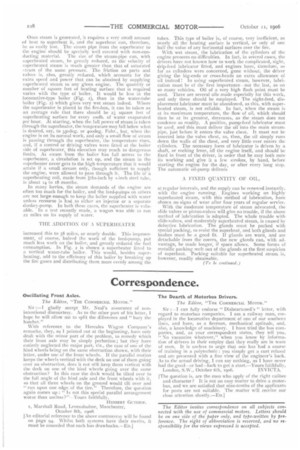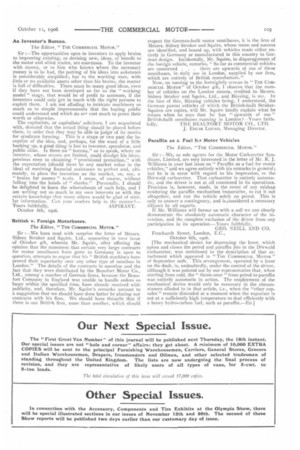Correspondence.
Page 18

Page 19

If you've noticed an error in this article please click here to report it so we can fix it.
Oscillating Front Axles.
The Editor, " TIIE COMMERCIAL M OTOR. "
Sir :—I gladly accept Mr. Neal's assurance of nonintentional discourtesy. As to the other part of his letter, I hope he will allow me to split the difference and " bury the hatchet."
With reference to the Hercules Wagon Company's remarks, they, as I pointed out at the beginning, have only dealt with the minor part of the problem, to remedy which their front axle may be simply perfection; but they have entirely neglected the major part, viz., the case of one of the hind wheels being on the same obstruction shown, with their letter, under one of the front wheels. If the parallel motion keeps the wheels vertical with the deck on one of them going -over an obstruction, does it not still keep them vertical with the deck on one of the hind wheels going over the same obstruction? In this case the deck would be tilted over to the full angle of the hind axle and the front wheels with it, so that all three wheels on the ground would tilt over and " run upon one edge of the tire." Therefore, the question _again comes up " Is not this special parallel arrangement worse than useless?"-Yours faithfully, HERBERT GUTIIR t, Marshall Road, Levenshulmc, Manchester, October 8th, 19°6:
jAn editorial reference to the above controversy will be found on page 94. Whilst both systems have their merits, it must be conceded that each has drawbacks.—En.1 The Dearth of Motorbus Drivers.
The Editor, "THE COMMERCIAL MOTOR."
Sir can fully endorse " Disheartened's " letter, wish
regard to motorbus companies. I am a railway man, employed in the locomotive department of one of our southern lines, and have, as a fireman, mechanical aptitude, and, also, a knowledge of machinery. I have tried the bus companies, and, as your correspondent states, they tell you, " No vacancies whatever," when you know by information of drivers in their employ that they really arc in want of men. It is useless to urge that one has had a course of training in a polytechnic : you simply get a curt refusal and are presented with a fine view of the engineer's back. As to the actual driving-, I can say nothing, as I have never had the good—or bad.—luck to get a start.—Yours 'faithfully,
London, S.W., October 6th, 1906. INVICTA.
[The question is, are the men who apply of the right calibre and character? It is not an easy matter to drive a motorbus, and we are satisfied that nine-tenths of the applicants for posts are not suitable. The matter will receive our close attention shortly.—ED.1
The Editor invites correspondence on all subjects connected with the use of commercial motors. Letters should be on one side of the paper only, and type-written by preference. The right of abbreviation is reserved, and no responsibility for the views expressed is accepted.
An Inventor's Bureau,
The Editor, "THE COMMERCIAL MOTOR."
Sir :—The opportunities open to investors to apply brains to improving existing, or devising new, ideas, of benefit to the motor and allied trades, are enormous. To the inventor with money, or to him who knows where the necessary money is to be had, the putting of his ideas into substance is considerably simplified; but to the working man, with little or no available assets other than his brains, the matter is full of difficulties. There must be many good ideas, even if they have not been developed so far as the " working model" stage, that would be of profit to someone, if the inventors could only 'get in touch with the right persons to exploit them. I am not alluding to intricate machinery so much as to simple improvements that the buying public could understand and which do not cost much to prove their worth or otherwise.
The capitalists, or capitalists' solicitors, I am acquainted with, demand that the actual thing should be placed before them, in order that they may be able to judge of its merits for syndicate forming. This is a stage or two past the inception of the idea, and, perhaps, for the want of a little backing up, a good thing is lost to inventor, speculator, and public alike. Is there no " bureau," so to speak, where an inventor, whose means are limited, could divulge his ideas, previous even to obtaining "provisional protection," with the expectation (should there be any market value in the idea) of receiving financial assistance to perfect and, ultimately, to place the invention on the market, on, say, a " brains for money" tasis. I mean, of course, without falling into the hands of " sharks." Personally, I should be delighted to learn the whereabouts of such help, and I am writing not so much in my own interests as with the certain knowledge that many others would be glad of similar information. Can your readers help in the matter?—
Yours faithfully, ASPIRANT. October 6th, t906.
British v. Foreign Motorbuses.
The Editor, "THE COMMERCIAL Mcrroe."
Sir :—We have read with surprise the letter of Messrs. Sidney Straker and Squire. Ltd., appearingin vour issue of October 4th, wherein Mr. Squire, after offering the 'opinion that the statement that certain very large contracts for motor omnibuses have gone to Germany is open to -question, attempts to argue that his " British machines have proved their superiority over any other type of omnibus in London." The details of the contracts in ouestion and the fact that they were distributed by the Beaufort Motor Co., Ltd., among a number of German firms, because the Beaufort Company in England was unable to handle orders so large within the specified time, have already received wide publicity, and, therefore, Mr. Squire's remarks amount to a suggestion that we should have done better by placing our contracts with his firm. We should have thoutrht that if there is one Briti,b firm, more than another, which should
respect the German-built motor omnibuses, it is the firm of Messrs. Sidney Straker and Squire, whose name and success are identified, and bound up, with vehicles made either entirely in Germany or manufactured in this country to German design. incidentally, Mr. Squire, in disparagement of the foreign vehicle, remarks, " So far as commercial vehicles are concerned . . there are upwards of 200 of these omnibuses, in daily use in London, supplied by our firm, which are entirely of British manufacture." Now, on turning to the fortnightly census in "THE COMMERCIAL MOTOR" of October 4th, I observe that the number of vehicles on the London streets, credited to Messrs. Sidney Straker and Squire, Ltd., and Bussing, is 201. In the face of this Bussing vehicles being, J understand, the German parent vehicles of which the British-built StrakerSquires are copies, will Mr. Squire kindly explain what he means when he says that he has " upwards of 200 " British-built omnibuses running in London? -Yours faith
fully, THE BEAUFORT MOTOR CO,, LTD. J. EDGAR Lou so, Managing Director.
Paraffin as a Fuel fc r Motor Vehicles The Editor, "THE COMMERCIAL MOTOR."
Sir :---We, as sole agents for the Motor Carburetter Syndicate, Limited, are very interested in the letter of Mr. R. J. Williams in your last issue on" Paraffin as a fuel for motor vehicles," and we agree entirely with his remarks in general; but he is in error with regard to his impression, re the Ddrwaid carburetter. That carburetter is entirely automatic, and the driver is not at all concerned in its operations. Provision is, however, made, in the event of any mishap rendering the paraffin mechanism inoperative, to cut it out altogether, and run the vehicle solely on petrol. This is Only to answer a contingency, and is,considered a necessary adjunct by all experts.
If Mr. Williams will favour us with a call we can clearly demonstrate the absolutely automatic character of the invention, and the complete exclusion of the driver from any participation in its operation.—Yours faithfully, GEO. NEILL AND CO. Fenchurch Street, London, E.C., [The mechanical device for depressing the lever, which opens and closes the petrol and paraffin jets in the Darwald carburetter, was mentioned in the description of that attachment which appeared in "THE COMMERCIAL MOTOR" of September 20th. This arrangement, operated by a lever on the dash, is, undoubtedly, under the control of the driver, although it was pointed out by our representative that, when starting from cold, the" throw-over" from petrol to paraffin was entirely automatic in action. The employment of the mechanical device would only be necessary in the circumstances alluded to in that article, i.e., when the "ether capsules" remain distended at a moment when the vaporiser is not at a sufficiently high temperature to deal efficiently with a heavy hydro-carbon fuel, such as paraffin.—Eol






















